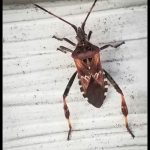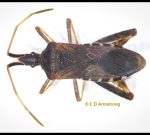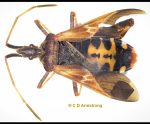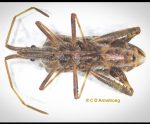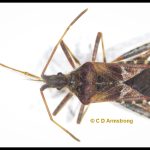Western Conifer Seed Bug
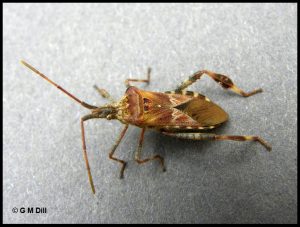
The Western Conifer Seed Bug (Leptoglossus occidentalis) is often mistaken by people for either the Asian Longhorned Beetle, or for an Assassin Bug. It is a type of leaf-footed bug that feeds on the sap of trees in the Pinaceae family such as pines, hemlocks, spruces, and Douglas-firs. It uses its straw-like mouthpart/beak to suck the sap from the green cones, twigs, seed pulp, and/or needles of its host trees. It does not harm the wood of a home, but is by and large merely a nuisance. One possible exception to this is the occasional reported damage to PEX pipes used in plumbing and radiant heating systems in some homes (follow the link to the Cornell study below for additional information on this interesting discovery).
Western conifer seed bugs find their way into homes during the end of summer and early fall looking for a warm and protected place to spend the winter. They emit a foul-smelling odor when disturbed, handled, pressed or crushed. Also, the sound of their wings while in flight resembles the buzzing sound of a wasp or hornet, which can be unnerving and startling when one flies past your ear or lands on you.
- Western Conifer Seed Bug (Leptoglossus occidentalis)
- Western Conifer Seed Bug
- Western Conifer Seed Bug with its wings spread partway open to reveal the abdominal patterning (When the insect is at rest, the wings are folded neatly over the abdomen, but when people see one like this they will often not recognize it as a western conifer seed bug)
- Western Conifer Seed Bug (ventral view with its proboscis held flush to its body)
- Western Conifer Seed Bug with its mouthparts (proboscis) extended (ordinarily–when at rest–the proboscis is held in place against the underside of its body as shown in the adjacent photo)
Additional Information:
- Western Conifer Seed Bug (Penn State)
- Western Conifer Seed Bug (BugGuide.net)
- Damage to common plumbing materials caused by overwintering Leptoglossus occidentalis [pdf] (Cornell research published in 2005)

